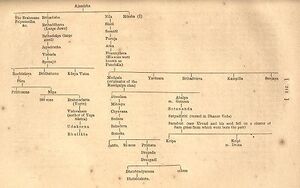Ajamidha
- For Gotra see Ajmeria

Ajamīḍha (अजमीढ़) and Ajakranda (अजक्रन्द) were janapada mentioned in Ashtadhyayi of Panini.
Ajamidha (अजमीढ़), was the perpetrator of the royal line of Bharatas. And he begat six sons,--
- Riksha was born of the womb of Dhumini,
- Dushmanta and Parameshthin, of Nili, and
- Jahnu, Jala and Rupina were born in that of Kesini.
Jat Gotras from Ajamidha
History
V. S. Agrawala[1] writes that Ashtadhyayi of Panini mentions janapada Ajamīḍha (अजमीढ़) and Ajakranda - Here prefix Aja is deity Asura Ajaka with whom king Shalva was identified as its incarnation. (Adiparva, 61.17)
Association with present Jat gotras
Ram Sarup Joon[2] writes ... Many names in the Genealogical tables of Yayati are associated with present Jat gotras. Some examples are Ushinar, Shishu Bhadra, Tak or Takshak, Satoti, Krishan or Kushana from the Yadhu branch; Dushyanta, Bharat, Bhardwaja, Hasti, Ajmirh, Kaushik, Gadh and Vishwamitra of Puru branch; Seth, Arh, Gandhi, Gaindhu and Gandhar of the Ardas branch.
Ram Sarup Joon[3] writes that Vir Bhadra was the ruler of the area known as Shiv Ki Jata. He was of Puru Vansh and ancestor of seven Jat gotras. In the same dynasty, the Jat gotras Midh, Midhan, Mel and Ajmel claim their descent from Raja Hasti of Hastinapur. Therefore, the continuous chain of Jat rule is traced back to Raja Yudhishtra, ruler of Hastinapur and Indraprastha, later known as Delhi. The third ruling Jat dynasty in this line was Dhillon whose descendants are the present Jat gotras Dhillon, Dhilwal and Dhill.
Ram Swarup Joon[4] writes abou Mirh-Midharh-Ajmirh-Sahotas: King Hasti who founded Hastinapur had three son's -Ajmirh, Devmirh and Purmirh. According to the Mejmaul ul Tawarikh, in the age of Duryodhana these people had settled down in the basin of the Indus River and were called Jatt.
The Mirh Jats are found in large numbers in the Western Punjab in Pakistan. In ancient times the Mirhs migrated, to Arabia, Syria and Baluchistan. References to the Mirh tribe are found through out Asia.
The Nawab of Karnal belonged to Midhan gotra.
Madhian, Mandan, Mandh and Mandhal are derivatives of the same gotra. They are found in large numbers in the districts of Jhang, Multan, Dera Ghazikhan, Muzaffargarh, Mainwali, Shahpur and Jhelum.
The Madha gotra is also found among the Rajputs, and they have 20 villages near Delhi and some in district Moradabad.
In Mahabharata
Samrat Bharat was a chandravansi King of India. Raja Ajmidh/Ajamidha was born in sixth generation of Maharaja Bharata. India gets its name Bharat from Maharaja Bharat. Maharaja Bharat had three sons namely Rikshu, Kanva and Meed. The descendants of the youngest son Meed were known as Ajmidhia or Ajmeria.
Sakuntala's son came to be called Bharata. And Bharata married Sunanda, the daughter of Sarvasena, the king of Kasi, and begat upon her the son named Bhumanyu. And Bhumanyu married Vijaya, the daughter of Dasarha. And he begat upon her a son Suhotra who married Suvarna, the daughter of Ikshvaku. To her was born a son named Hasti who founded this city, which has, therefore, been called Hastinapura. And Hasti married Yasodhara, the princess of Trigarta. And of her was born a son named Vikunthana who took for a wife Sudeva, the princess of Dasarha. And by her was born a son named Ajamidha. And Ajamidha had four wives named Raikeyi, Gandhari, Visala and Riksha. And he begat on them two thousand and four hundred sons. [5]
According to James Todd[6] Hastin sent forth three grand branches, Ajamidha, Dvimidha, and Purumidha. Of the two last we lose sight altogether ; but Ajamidha's progeny spread over all the northern parts of India, in the Panjab and across the Indus. The period, probably one thousand six hundred years before Christ.
[p.50]: From Ajamidha[7] in the fourth generation, was Bajaswa, who obtained possessions towards the Indus, and whose five sons gave their name, Panchala, to the Panjab, or space watered by the five rivers. The capital founded by the younger brother, Kampila, was named Kampilnagara. Of this house was Draupadi, the wife, in common, of the five Pandava brothers : manners peculiar to Scythia.
The descendants of Ajamidha by his second "wife, Kesini, founded another kingdom and dynasty, celebrated in the heroic history of Northern India. This is the Kausika dynasty.
Distribution
Notable Jats
References
- ↑ V. S. Agrawala: India as Known to Panini, 1953, p.58
- ↑ History of the Jats/Chapter II,p. 28
- ↑ History of the Jats/Chapter IV ,p. 44
- ↑ Ram Swarup Joon: History of the Jats/Chapter V,p. 94-95
- ↑ http://www.jatland.com/home/Adi_Parva,_Mahabharata/SECTION_XCV,p.203
- ↑ James Todd Annals/Chapter 4 Foundations of States and Cities by the different tribes,p.49-50
- ↑ Ajamidha, by his wife Nila, had five sons, who spread their branches (Sakha) on both sides the Indus. Regarding three the Puranas are silent, which implies their migration to distant regions. Is it possible they might be the origin of the Medes ? These Medes are descendants of Yayati, third son of the patriarch Manu ; and Madai, founder of the Medes, was of Japhet's line. Ajamidha, the patronymic of the branch of Bajaswa, is from Aja, ' a goat.' The Assyrian Mode, in Scripture, is typified by the goat. [These speculations are worthless.]
Back to Gotras

